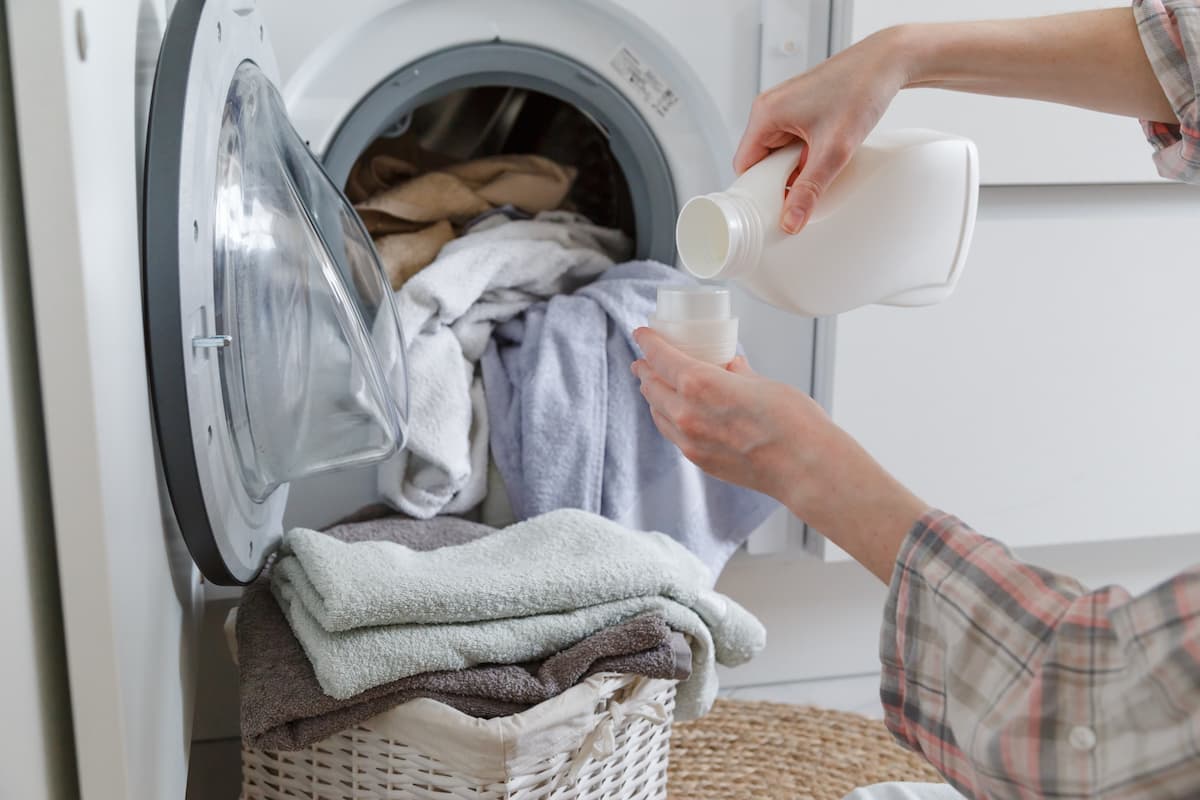PVC and vinyl are common materials used for many building and plumbing materials. While they are similar in use, their chemical composition makes them react differently to glues and adhesives.
PVC glue will not adhere to vinyl. To glue vinyl to itself, use Loctite Vinyl, Fabric & Plastic Flexible Adhesive or another extra strength super glue. To connect a PVC pipe to a vinyl hose, use a hose barb or heat to stretch the vinyl over the PVC. Then, cool the vinyl to secure it to the PVC.
There are ways to connect vinyl to a PVC pipe, but you can’t use glue to do so. More information about how to connect vinyl to PVC pipes is below.

Best Glue to Use on Vinyl
PVC is often mistaken for vinyl, but they aren’t the same chemically.
PVC stands for Polyvinyl Chloride. PVC is a synthetic polymer of plastic, whereas vinyl is a radical of ethane. This means they won’t react the same way when put in contact with certain glues.
To glue PVC to itself, weld glue is often used.
Weld glue interacts with the chemicals in the PVC to melt them. Once the PVC is chemically melted without heat, it can be “welded” to another piece of PVC to connect them. This is known as cold welding.
This type of glue only works on PVC because of the chemical makeup of the glue and the PVC.
The chemicals in the glue react with the chemicals in the PVC and create a reaction. This reaction isn’t possible with vinyl because it’s chemically different.
The best glue to use on vinyl is Loctite Vinyl, Fabric & Plastic Flexible Adhesive. This is a type of super glue that is designed to flex with vinyl. Other types of extra strength super glue are also effective adhesives for vinyl.
These types of glues will create a bond between vinyl and itself, but they can also bond vinyl to other materials. Some materials will adhere better than others.
Can I Glue PVC to Vinyl?
While there aren’t many types of glue that will connect PVC to vinyl well, there are ways to connect PVC to vinyl that are as effective as glue. If you are working with tubing, the best thing to use is a hose barb.
Check out this YouTube video for more information on hose barbs.
A hose barb is a connector piece that latches onto the inside of the vinyl hose and connects to the PVC pipe. These barbs can be threaded or slip-on. A threaded barb will require a threaded fitting on the end of the PVC.
After you connect your PVC to your vinyl hose, you will need to secure it with a clamp.
Slide the hose clamp over your vinyl tube before connecting them with the barb. After you’ve connected your vinyl to the PVC pipe, slide the hose clamp over the vinyl that is covering the barb and tighten it.
This will keep your hose tightly sealed and minimize leaks and wear in the vinyl hose.
Another method of fitting your tubing to the PVC pipes is the heat and cool method.
PRO-TIP. Select vinyl tubing that is slightly bigger than your PVC pipe to ensure that this method will work.
Heat the vinyl tubing so the materials expand, making the hose opening bigger. When the hose has expanded, slide it over the PVC pipe and allow it to cool. Once it has cooled you can reinforce it with a clamp.
If you are working with a non-critical bond that shouldn’t be put under significant stress, you may use super glue designed for vinyl and plastic such as Loctite Vinyl Fabric & Plastic Flexible Adhesive. This will create a light-duty seal, but glue should only be used as a last resort. If you want to reinforce a bond, use glue.
Will PVC Glue Work on Vinyl Siding?

Generally, siding that is known as “vinyl siding” is actually PVC.
Some PVC products are known as vinyl although they aren’t true vinyl, as we know it. Because vinyl siding is made from PVC, PVC glue will work on vinyl siding.
The best glue to get for a siding project is Liquid Nails Siding and Trim Construction Adhesive, LN-501. This glue will bond a PVC shim (strip of PVC attached to the house) to the PVC siding.
Liquid Nails is designed to adhere to some common construction surfaces, but the use of a shim ensures that your siding will stick, regardless of other materials on the house.
Liquid Nails is a great option for PVC “vinyl,” but it doesn’t bond to true vinyl well.
Other PVC glues, types of cement, and weld glues are also effective in securing siding to a house.
These will always work when there is a PVC shim to attach the siding to. If you are working with other construction materials, you will need to check your adhesives to see if they will bond to the materials.
Does Anything Bond Vinyl to Vinyl?
Vinyl can be bonded to itself or another type of vinyl by super glue.
Some super glues work better than others, but the super glue to use on vinyl is Loctite Vinyl Fabric & Plastic Flexible Adhesive.
If you intend to glue something that needs strict durability, consider other options of securing your vinyl together in addition to gluing the surfaces together.
Other types of glue and adhesives that will bond vinyl to vinyl include:
- Polyurethane glues
- Epoxy resin
- Silicone glue
Tips

Know your Project. Know the purpose of the glue you are using. For example, if you want to glue tubing together, make sure you have flexible glue.
Use plumber’s tape. When fitting hoses together, it is a good idea to use plumber’s tape to make sure everything is secure and sealed.
Putting a layer of tape on your threads before connecting a hose barb to the PVC end will work as a gasket and seal the connection so water can’t escape.
Better safe than sorry. When sealing things that need to have a strong bond, be aware that there is more than one material you can use to connect, bond, or seal vinyl and PVC.
For example, if you connect pipes with a hose barb, adding plumber’s tape, glue, or a hose clamp will strengthen the seal and reduce the risk of leaks.





